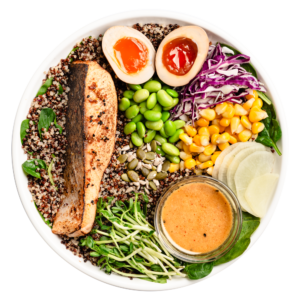The connection between gut health and mental health has emerged as a key area of interest in both nutrition and psychological sciences. The gut, often called the “second brain,” communicates with the central nervous system through the gut-brain axis, influencing mood, cognition, and overall mental well-being. Nutrition plays a crucial role in maintaining a healthy gut microbiome, which in turn, supports mental health.
The Gut-Brain Axis: A Complex Communication Network
The gut-brain axis is a bidirectional communication system that links the gastrointestinal tract with the brain. This system relies on a variety of pathways, including the vagus nerve, the immune system, and the release of neurotransmitters. The gut is home to trillions of microbes, collectively known as the gut microbiome, which play a significant role in this communication.
The gut microbiome plays a crucial role in producing neurotransmitters like serotonin, commonly known as the “feel-good” hormone. In fact, the gut produces about 90% of the body’s serotonin. Additionally, the balance of gut bacteria affects the production of other neurotransmitters such as dopamine and gamma-aminobutyric acid (GABA), both of which are crucial for regulating mood and stress responses.
The Role of Nutrition in Gut Health
Nutrition is a critical factor in shaping the gut microbiome. The foods we eat provide the nutrients necessary for the growth and maintenance of gut bacteria, which in turn, influence mental health. Here’s how different dietary components affect gut health and, by extension, mental well-being:
1. Fiber-Rich Foods
Dietary fiber, found in fruits, vegetables, legumes, and whole grains, serves as a prebiotic, which feeds beneficial gut bacteria. These bacteria ferment fiber to produce short-chain fatty acids (SCFAs) like butyrate, propionate, and acetate. SCFAs have anti-inflammatory properties and are crucial for maintaining the integrity of the gut lining. A healthy gut lining prevents the leakage of harmful substances into the bloodstream, which can trigger inflammation and negatively impact mental health.
2. Probiotics
Probiotics are live bacteria that provide health benefits when consumed in adequate amounts. You can find them in fermented foods like yogurt, kefir, sauerkraut, and kimchi. Probiotics help to maintain a balanced gut microbiome by increasing the population of beneficial bacteria and reducing harmful ones. Some studies suggest that probiotics can reduce symptoms of anxiety and depression by modulating the gut-brain axis.
3. Omega-3 Fatty Acids
Omega-3 fatty acids, found in fatty fish, flaxseeds, and walnuts, are known for their anti-inflammatory properties. These fats are essential for brain health and have been shown to improve mood and reduce symptoms of depression. Omega-3s also play a role in maintaining the structure of cell membranes in the brain, which is crucial for efficient communication between brain cells.
4. Polyphenols
You can find polyphenols, plant compounds, in foods like berries, tea, coffee, and dark chocolate. These compounds have antioxidant properties and can support the growth of beneficial gut bacteria. By reducing oxidative stress and inflammation, polyphenols contribute to better mental health outcomes.
5. Sugar and Processed Foods
Diets high in sugar and processed foods can have a detrimental effect on the gut microbiome. Moreover, these foods promote the growth of harmful bacteria, leading to an imbalance in the gut microbiome known as dysbiosis. Consequently, dysbiosis is associated with increased inflammation, which can negatively affect brain function and contribute to mood disorders like anxiety and depression.
The Impact of Gut Health on Mental Health
The gut microbiome influences mental health in several ways. First, the production of neurotransmitters like serotonin and GABA directly impacts mood regulation. Second, the gut’s immune function affects inflammation levels, which are linked to mental health disorders. Chronic inflammation, often resulting from an unhealthy gut, has been implicated in the development of depression and anxiety.
Additionally, the gut microbiome plays a role in the body’s stress response. A balanced microbiome helps regulate the production of stress hormones like cortisol. An imbalanced microbiome, however, can lead to an exaggerated stress response, increasing the risk of mental health issues.
Maintaining a healthy gut through proper nutrition is essential for supporting mental health. A diet rich in fiber, probiotics, omega-3 fatty acids, and polyphenols can promote a balanced gut microbiome, reducing inflammation and supporting the production of mood-regulating neurotransmitters. On the other hand, diets high in sugar and processed foods can disrupt the gut-brain axis, leading to mental health challenges. By making mindful food choices, we can nurture our gut health and, in turn, improve our mental well-being. For those seeking to make wise nutritional choices, they may opt to use SaladStop!’s nutritional calculator to create bowls tailored to their specific needs.




